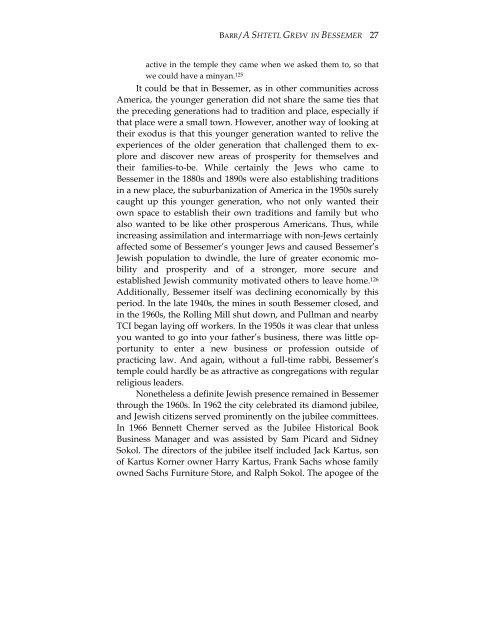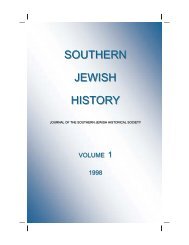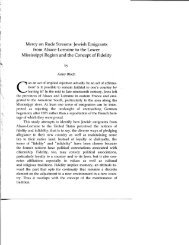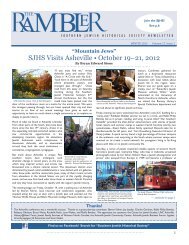A Shtetl Grew in Bessemer - Southern Jewish Historical Society
A Shtetl Grew in Bessemer - Southern Jewish Historical Society
A Shtetl Grew in Bessemer - Southern Jewish Historical Society
Create successful ePaper yourself
Turn your PDF publications into a flip-book with our unique Google optimized e-Paper software.
BARR/A SHTETL GREW IN BESSEMER 27<br />
active <strong>in</strong> the temple they came when we asked them to, so that<br />
we could have a m<strong>in</strong>yan. 125<br />
It could be that <strong>in</strong> <strong>Bessemer</strong>, as <strong>in</strong> other communities across<br />
America, the younger generation did not share the same ties that<br />
the preced<strong>in</strong>g generations had to tradition and place, especially if<br />
that place were a small town. However, another way of look<strong>in</strong>g at<br />
their exodus is that this younger generation wanted to relive the<br />
experiences of the older generation that challenged them to explore<br />
and discover new areas of prosperity for themselves and<br />
their families-to-be. While certa<strong>in</strong>ly the Jews who came to<br />
<strong>Bessemer</strong> <strong>in</strong> the 1880s and 1890s were also establish<strong>in</strong>g traditions<br />
<strong>in</strong> a new place, the suburbanization of America <strong>in</strong> the 1950s surely<br />
caught up this younger generation, who not only wanted their<br />
own space to establish their own traditions and family but who<br />
also wanted to be like other prosperous Americans. Thus, while<br />
<strong>in</strong>creas<strong>in</strong>g assimilation and <strong>in</strong>termarriage with non-Jews certa<strong>in</strong>ly<br />
affected some of <strong>Bessemer</strong>’s younger Jews and caused <strong>Bessemer</strong>’s<br />
<strong>Jewish</strong> population to dw<strong>in</strong>dle, the lure of greater economic mobility<br />
and prosperity and of a stronger, more secure and<br />
established <strong>Jewish</strong> community motivated others to leave home. 126<br />
Additionally, <strong>Bessemer</strong> itself was decl<strong>in</strong><strong>in</strong>g economically by this<br />
period. In the late 1940s, the m<strong>in</strong>es <strong>in</strong> south <strong>Bessemer</strong> closed, and<br />
<strong>in</strong> the 1960s, the Roll<strong>in</strong>g Mill shut down, and Pullman and nearby<br />
TCI began lay<strong>in</strong>g off workers. In the 1950s it was clear that unless<br />
you wanted to go <strong>in</strong>to your father’s bus<strong>in</strong>ess, there was little opportunity<br />
to enter a new bus<strong>in</strong>ess or profession outside of<br />
practic<strong>in</strong>g law. And aga<strong>in</strong>, without a full-time rabbi, <strong>Bessemer</strong>’s<br />
temple could hardly be as attractive as congregations with regular<br />
religious leaders.<br />
Nonetheless a def<strong>in</strong>ite <strong>Jewish</strong> presence rema<strong>in</strong>ed <strong>in</strong> <strong>Bessemer</strong><br />
through the 1960s. In 1962 the city celebrated its diamond jubilee,<br />
and <strong>Jewish</strong> citizens served prom<strong>in</strong>ently on the jubilee committees.<br />
In 1966 Bennett Cherner served as the Jubilee <strong>Historical</strong> Book<br />
Bus<strong>in</strong>ess Manager and was assisted by Sam Picard and Sidney<br />
Sokol. The directors of the jubilee itself <strong>in</strong>cluded Jack Kartus, son<br />
of Kartus Korner owner Harry Kartus, Frank Sachs whose family<br />
owned Sachs Furniture Store, and Ralph Sokol. The apogee of the







